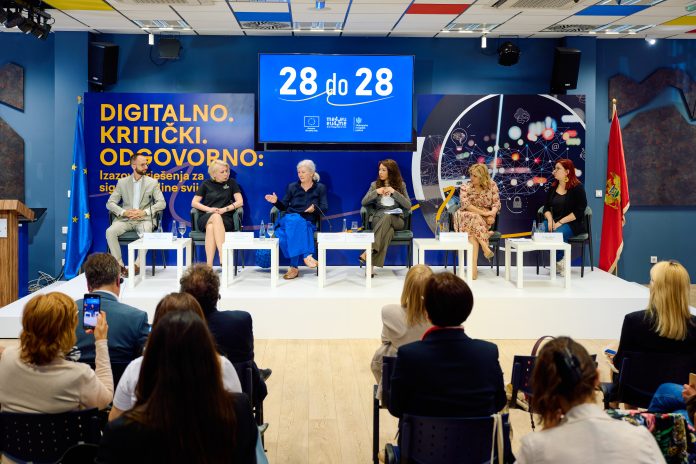The Ministry of European Affairs, through the EU4ME project, in cooperation with the Ministry of Culture and Media, organized a panel discussion on Chapter 10 – Information Society and Media, entitled “Digital. Critical. Responsible: Challenges and Solutions for a Safe Online World.” The discussion focused on key challenges in Montenegro’s digital transition process in the context of European integration – particularly in areas such as digital space regulation, combating disinformation, the use of artificial intelligence, cybersecurity, and user protection.
In his opening remarks, the Chief Negotiator with the European Union, Predrag Zenović, emphasized the importance of digital literacy and skills for successfully adapting to modern trends within the framework of European integration.
“Chapter 10 includes both the digital society and media. It is important that we build our capacities in order to be digitally prepared for everything the European Union has envisioned with its Digital Compass, aiming to be digitally ready for the times and challenges we live in by 2030,” said Zenović.
Ružica Mišković, Head of the Negotiating Working Group for this chapter, stressed that Montenegro is facing major obligations in aligning with European legislation.
“This is one of the most dynamic and demanding chapters due to the pace of technological advancement. We face obligations concerning legislative alignment, as well as concrete activities that require an active, efficient, and committed approach,” Mišković emphasized.
Sunčica Bakić from the Agency for Audiovisual Media Services pointed out that although Montenegro has formally aligned key media laws with European directives, implementation remains the main challenge.
“Alignment with European regulation is important, but we also need to address specific domestic challenges that are not recognized in other EU countries. Without solving these issues, European principles cannot be fully applied here,” Bakić stated.
In this context, the application of the Digital Services Act (DSA) and the broader framework of digital regulation is also crucial, which, according to Professor Sandra Bašič-Hrvatin from the Faculty of Humanities at the University of Primorska, is a very complex process.
“This is a technically demanding regulation that requires coordination of all state institutions and political consensus. We are talking about a system that simultaneously involves self-regulation, co-regulation, and regulation. If we want to address problems like disinformation, manipulation, fake profiles, and the influence of AI on political processes – we need coordinated, effective regulation in line with European rules,” Bašič-Hrvatin explained.
This is why, as emphasized by Snežana Nikčević from NGO 35 mm, it is also important that citizens are aware of their digital rights.
“It is crucial that every user knows what digital traces they leave, who collects them, how they may be targeted, and how their opinion can be shaped. Today, traditional media no longer primarily shape public opinion – algorithms and digital platforms have taken over that role,” said Nikčević.
Although adherence to rules is extremely important, Andreja Mihailović from the organization Women4Cyber highlighted the importance of a flexible legislative approach in a rapidly changing digital environment.
“Rules build trust, and trust enables sustainable technological progress. However, overregulation can be counterproductive, especially in areas like generative AI models. The European AI Act has recognized the need for gradual implementation and constant updating,” said Mihailović.
Nada Rakočević, Secretary of the ICT Association Board at the Chamber of Commerce of Montenegro, pointed out weaknesses in the digital transformation of the economy.
“The level of digital transformation of the economy is not at a satisfactory level, and thus opportunities for more successful participation in the global market are being missed. A systemic strengthening of digital competencies is needed, starting from education at the earliest stages, so we can build generations ready for a digital business environment,” Rakočević explained.
The discussion was held as part of the “28to28” campaign, which aims to bring citizens closer to the benefits of EU membership and the closure of negotiation chapters.


